Diplomacy should be business-centred: PM
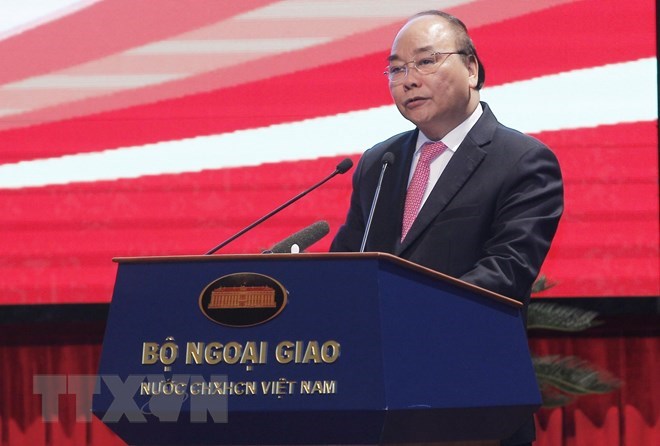
Prime Minister Nguyen Xuan Phuc speaks at a plenary session of the 30th Diplomatic Conference on August 15.
Diplomacy should be centred around helping Vietnamese enterprises reach out to the world, said Prime Minister Nguyen Xuan Phuc at a plenary session of the 30th Diplomatic Conference on August 15, which discussed the promotion of diplomacy to develop the economy in the era of intensive global integration.
Diplomacy must uphold the principle of taking action to boost economic development. It should translate the strong relations between Vietnam and other countries and foreign partners into opportunities for economic cooperation and global integration, the PM added.
He expressed his appreciation of many Vietnamese ambassadors’ efforts in coordinating closely with ministries and local governments to promote trade and expand markets overseas with diversified and effective approaches.
Phuc urged all diplomats to take more active roles in shaping and promoting multilateral partnerships and, at the same time, guide and foster the expansion of all-round cooperation with a focus on economy. In addition, they must provide accurate and up-to-date information on foreign markets for the government, ministries, localities, and enterprises as well as give advices on foreign economic diplomacy and development, he added.
He suggested that diplomats double efforts to search for external resources, promote trade overseas, develop the labour market, call for ODA, and attract more remittance and visitors to Vietnam, all of which will aid the country in striving towards a digital and smart economy.
“Vietnamese embassies should not only serve the Government and the prime minister, but also localities and both private and State-owned enterprises for the ultimate key goal of developing the national economy,” the PM stressed.
The government leader also emphasised the importance of information for foreign service, citing 4,000 foreign reporters covering events in Vietnam in 2017.
“This is an important channel to promote the potential, country and people of Vietnam to the world,” he noted.
At the event, Prime Minister Nguyen Xuan Phuc spoke highly of the contribution of diplomacy to the country’s achievements.
Resources brought by both internal and external diplomacy have been attributed to the country’s economic restructuring and strong economic growth over recent years, he noted, referring to the fact that Vietnam is the only ASEAN member state to have set up strategic and comprehensive partnerships with five permanent members of the UN Security Council, the entire G7, as well as 13 of the G20 countries.
Over the last two years, Vietnam has taken great advantage of ambassadors and delegations’ missions abroad to organise hundreds of trade and investment promotion events, particularly the promotion of the country’s key agricultural products.
Speaking at the conference, Chairman and General Director of the military-run telecom group Viettel Le Dang Dung voiced his hopes to continue receiving enthusiastic support from Vietnamese diplomatic corps overseas. He asked diplomats to put more effort into bridging domestic and foreign businesses, strengthening legal support for Vietnamese enterprises abroad, and facilitating them to seek overseas trade and investment opportunities.
The diplomatic conference, which was initiated in 1957, convenes every two years to provide a venue for the diplomatic sector to reach a consensus on awareness, resolve, and action to effectively implement the Party and State’s foreign policy.
The event’s 30th edition opened in Hanoi on August 13, aiming to discuss measures to maintain the effective implementation of the 12th National Party Congress’ resolution, which emphasised the tasks of protecting national independence, sovereignty, unification, and territorial integrity; maintaining peace and stability to serve national development; expanding diplomatic relations; effectively implementing international integration; and continuing to raise the country’s position and prestige on the international stage.
PM inspects maintenance of President Ho Chi Minh Mausoleum
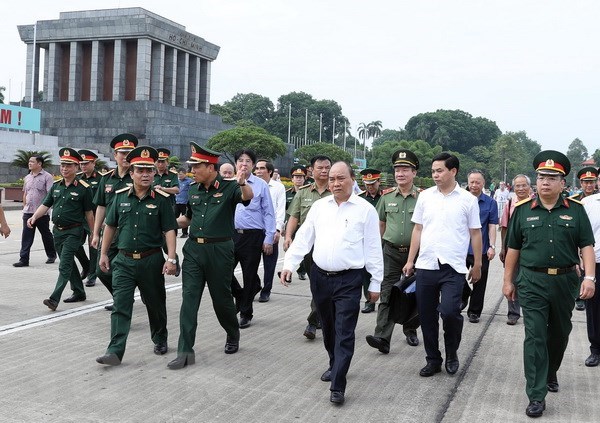
PM Nguyen Xuan Phuc inspects the maintenance of President Ho Chi Minh Mausoleum on August 15
Prime Minister Nguyen Xuan Phuc on August 15 applauded efforts by relevant units in maintaining and renovating both the President Ho Chi Minh Mausoleum and the Monument for Heroic Mothers in Hanoi.
At a working session with the mausoleum’s management board, the Government leader highly appreciated the application of science and technology in preserving the corpse of President Ho Chi Minh.
He asked the management board to improve the information work in order to promote the cultural and educational values of the mausoleum. He also asked relevant agencies to work harder to ensure the security and safety of the site.
The PM instructed the Ministry of Construction to coordinate with the Hanoi People’s Committee to set forth a plan on building an underground parking lot in the Ba Dinh Cultural-Historical Relic Complex.
According to the management board, the mausoleum will reopen for visitors from August 16 after a temporary closure for annual maintenance and renovation in 2018.
Major General Nguyen Van Cuong, head of the board, said that they had maintained and repaired the equipment and architecture of both the mausoleum and monument.
The management board joined hands with relevant agencies to ensure security and safety during memorial services paying tribute to the late President and other heroic martyrs, as well as for cultural and political activities around the mausoleum.
The sites were closed for annual maintenance and renovation from June 15 to August 15.
The Ho Chi Minh Mausoleum is an important landmark of the capital city and is integral to the political and social history of Vietnam.
After his death on September 2, 1969, President Ho Chi Minh was embalmed and later placed for viewing at this granite mausoleum. The mausoleum, modelled after Lenin’s tomb in Moscow, was built in two years from 1973 to 1975, with materials donated by people from all over the country.
The mausoleum welcomed nearly 51,000 visitors, including 11,500 foreigners, during holidays in celebration of the 43rd National Reunification Day (April 30) and International Workers’ Day (May 1) this year.
India’s Independence Day celebrated in Hanoi
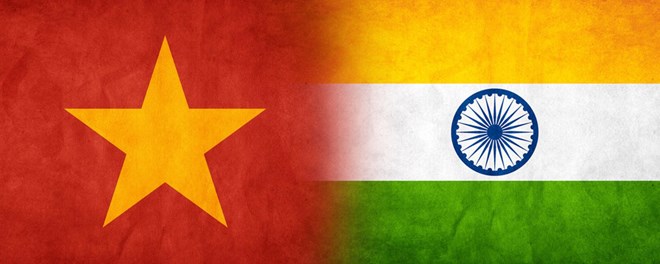
The Embassy of India in Vietnam hosted a ceremony to celebrate the 71st anniversary of India’s Independence Day (August 15, 1947) in Hanoi on August 15.
The event was attended by Indian Ambassador to Vietnam Harish Parvathaneni; Chairman of the National Assembly’s Ethnic Affairs Committee and Chairman of the Vietnam-India Parliamentary Friendship Group Ha Ngoc Chien; Deputy Foreign Minister Le Hoai Trung; and Vice President of the Vietnam Buddhist Sangha Most Venerable Thich Duc Thien.
In his remarks at the event, Ambassador Parvathaneni reminded his guests of the history of Vietnam-India relations which date back more than 2,000 years ago when Indian merchants and monks came to Vietnam to trade goods and spread the teaching of Buddhism.
The two nations lifted their ties to the level of Comprehensive Strategic Partnership during the visit of Indian Prime Minister Narendra Modi to Vietnam in September 2016, which has brought new impetus to the expansion of the bilateral cooperation in many fields, he said.
The two countries’ leaders have identified strong economic cooperation as a key factor driving the bilateral relations, the ambassador noted, highlighting the mutual goal of raising two-way trade to 15 billion USD by 2020.
Parvathaneni said he is pleased to know that Indian enterprises have more business opportunities in Vietnam, particularly in the areas of energy, petroleum, agriculture and agricultural processing, banking, textiles and garment, engineering, and services. Vietnam and India have also co-held a number of cultural exchange events, notably a series of Yoga Day events across Vietnamese cities and provinces this year.
He moved on to say ASEAN is the centre of India’s Act East Policy, with Vietnam as a key pillar of the grouping. For this reason, Vietnam has made it possible for India to gain access to other ASEAN member states, contributing to the success of the ASEAN-India Commemorative Summit earlier this year. He vowed to further foster the Comprehensive Strategic Partnership between the two nations.
Deputy FM Le Hoai Trung, for his part, said Vietnamese people are proud to have a loyal friend like India, noting that political trust has been proven through high-level visits between the two sides.
Indian FM Sushma Swaraj will visit Vietnam and co-chair the 16th meeting of the Vietnam-India intergovernmental committee later this month, he said, adding that he expects the two countries will continue working closely and supporting each other at international forums and organisations.
He expressed his belief in the bright future of long-standing relations and Comprehensive Strategic Partnership between Vietnam and India, for the benefit of the two peoples as well as the peace, stability, and prosperity of the region and the world.
Condolences extended to Italy over Genoa bridge collapse
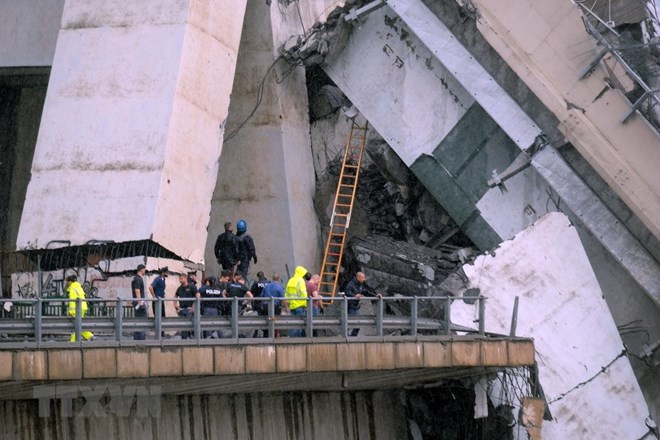
Vietnamese leaders extend condolences to Italy over Genoa bridge collapse.
President Tran Dai Quang on August 15 cabled a message of condolences to his Italian counterpart Sergio Mattarella over the Morandi Bridge collapse, which occurred in the northern city of Genoa a day earlier.
The same day, Prime Minister Nguyen Xuan Phuc extended his sympathies to Italian Prime Minister Giuseppe Conte over the tragedy.
Deputy Prime Minister and Foreign Minister Pham Binh Minh also sent a message of condolences to Italian Foreign Minister Enzo Maovero Milanesi.
The Morandi Bridge suddenly crumbled on August 14 morning, plunging down 45 metres onto a riverbed, buildings and streets below, burying dozens of vehicles and people under the rubble.
According to Reuters, death toll was estimated at 39.
Vietnam Coast Guard asked to better support fishermen
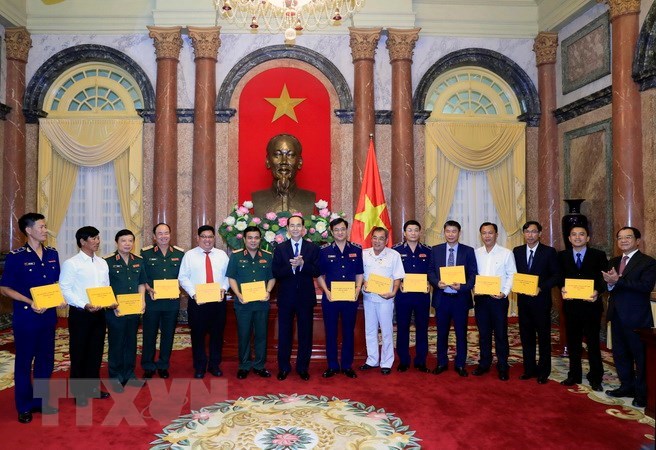
President Tran Dai Quang on August 15 requested the Vietnam Coast Guard to continue coordinating with authorities of island communes and districts to provide more effective and practical assistance for fishermen.
During a meeting in Hanoi with outstanding representatives of the force, authorities and fishermen of 11 island communes and districts, and representatives from businesses and socio-political organisations on the occasion of the 20th founding anniversary of the Vietnam Coast Guard (August 28), the State leader also reaffirmed that sea and islands hold an extremely important position and role in the national construction and defence.
He asked authorities of the coastal localities, including island communes and districts, to continue turning the Party and State’s policies, especially the Vietnam Maritime Strategy till 2020, into specific plans and measures to develop maritime economy sustainably, combine cultivation development with increasing the efficiency of fishing, and develop tourism services.
It is also important to develop maritime economy in line with ensuring defence and security, ensure social welfare, and help island communes and districts grow further, he added.
Over the past two decades, the Vietnam Coast Guard has fulfilled its tasks of patrolling and controlling law enforcement at sea, and helped protect the national sovereignty by law.
The force has taken the initiative in search and rescue activities, disseminating laws to fishermen, and carrying out military and defence diplomacy.
Since the beginning of 2017, it has implemented a “Vietnam Coast Guard go along with fishermen” programme in island communes and districts, which has contributed to strengthening the political system in these localities, making fishermen feel secured to earn their living and safeguarding the national sovereignty as well as sea and island security and safety.
President urges all people to join security protection movement
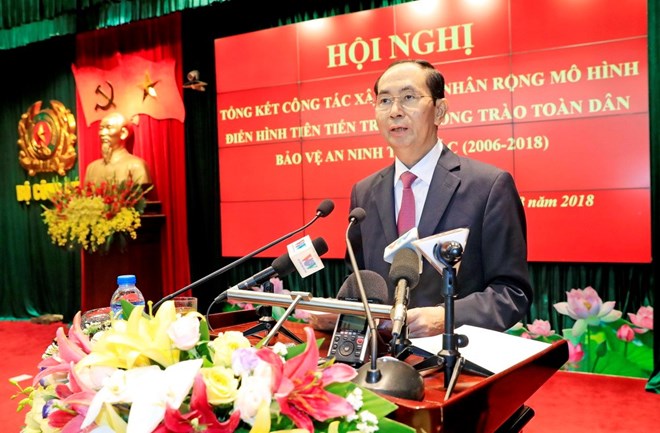
President Tran Dai Quang has called on the whole Party, people and army to heighten revolutionary vigilance and combating spirit to firmly defend national security and ensure social order and safety.
The President made the call while attending a ceremony held by the Ministry of Public Security in Hanoi on August 15 to review the “All people protect national security” movement in 2006-2018.
He pointed out opportunities and challenges as the country is entering a period of comprehensive reform, industrialisation, modernisation, and international integration.
The President hailed effective models and outstanding individuals in the field, which, he said, will be one of the important practical foundations for the Party and State to promulgate policies and solutions to strengthen the protection of national security and order.
He ordered further reforms in terms of forms and measures to build the “All people protect national security” movement in line with specific conditions of each region and field while enhancing coordination between the Public Security Force and the Vietnam People’s Army, Vietnam Fatherland Front, relevant agencies and sectors.
The State leader suggested improving the quality of self-management, self-defence, self-protection and self-reconciliation models in addition to rewarding contributors in the fight against crimes.
In the 2016-2018 period, the country has 2,080 typical models in the movement, which helped the police uncover over 300,000 cases, arrest nearly 200,000 violators, and crack down on thousands of criminal gangs.
Congratulations to Republic of Korea on Liberation Day
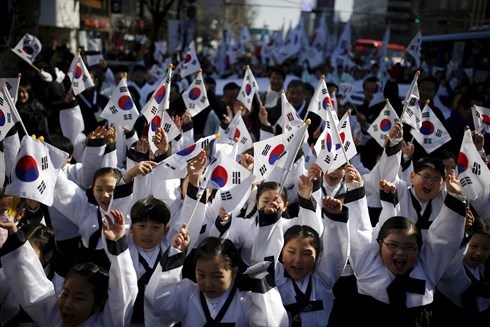
Vietnamese President Tran Dai Quang on August 15 sent a congratulatory message to President of the Republic of Korea (RoK) Moon Jae-in on the country’s 73rd Liberation Day (August 15).
On this occasion, Vietnamese Prime Minister Nguyen Xuan Phuc and National Assembly Chairwoman Nguyen Thi Kim Ngan extended congratulations to their RoK counterparts Lee Nak-yeon and Moon Hee-sang, respectively.
Deputy Prime Minister and Foreign Minister Pham Binh Minh also sent a message of congratulations to RoK Foreign Minister Kang Kyung-wha.
Vietnam and the RoK oficially established diplomatic ties on December 22, 1992. Since then, relations between the two countries have been growing fruitfully in different fields.
The RoK is currently Vietnam’s largest foreign investor, with accumulative registered capital of over 60 billion USD. Up to 5,500 Korean firms are operating in Vietnam and creating millions jobs for Vietnamese workers.
According to the General Department of Vietnam Customs, two-way trade between Vietnam and the RoK hit 61.5 billion USD in 2017, a year-on-year increase of 41.3 percent. Vietnam’s exports to the RoK reached 14.8 billion USD, while its imports from the RoK stood at 46.7 billion USD, up 30 percent and 45.3 percent against 2016, respectively.
Last year, around 2.5 million Korean tourists visited Vietnam, while the number of Vietnamese holidaymakers to the RoK surged by 70 percent. People-to-people exchanges have been also held at all levels and in all fields.
Vietnam congratulates India on Independence Day
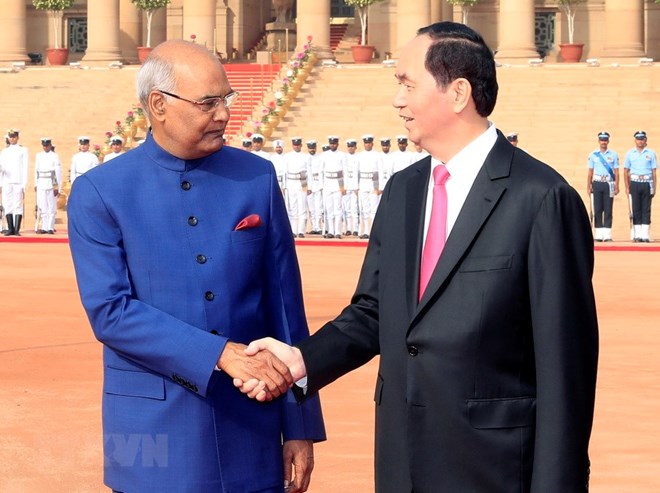
Indian President Ram Nath Kovind (L) welcomed President Tran Dai Quang in New Delhi on March 3, 2018.
Vietnamese President Tran Dai Quang on August 15 sent a message of congratulations to Indian President Ram Nath Kovind on the 72nd anniversary of India’s Independence Day (August 15).
The same day, Prime Minister Nguyen Xuan Phuc cabled congratulatory message to his Indian counterpart Narendra Modi.
Deputy Prime Minister and Minister of Foreign Affairs Pham Binh Minh also took the occasion to extend congratulations to Indian Minister of External Affairs Sushma Swaraj.
Vietnam and India set up diplomatic ties in January, 1972. Since then, the bilateral political relationship and mutual trust have been strengthened thanks to the constant exchange of high-level visits, during which the two countries have signed 17 more agreements on cooperation across the fields.
The two nations have enjoyed thriving economic partnership with two-way trade registering an impressive growth of more than 40 percent, from 5.6 billion USD in 2016 to 7.63 billion USD in 2017. The trade value is expected to surpass 10 billion USD this year.
Currently, India ranks 27th among 126 countries and territories investing in Vietnam with nearly 200 projects worth about 875 million USD.
WB willing to support Vietnam in building e-government
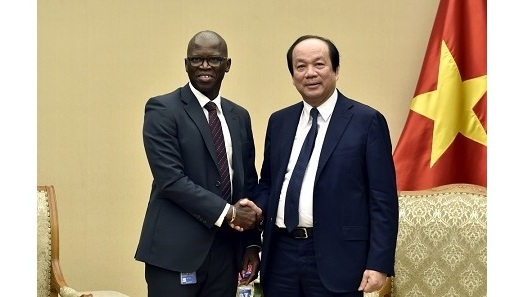
Minister - Head of the Government Office Mai Tien Dung and WB Country Director to Vietnam Ousmane Dione. (Photo: VGP)
World Bank (WB) Country Director to Vietnam, Ousmane Dione, has expressed his group’s willingness in supporting Vietnam in terms of resources and signing the framework for cooperation in building e-government.
During a recent meeting with Minister - Head of the Government Office, Mai Tien Dung, the WB official praised the efforts made by the Government Office in e-government development, with positive results in promoting reform, especially in the one-stop shop mechanism, improved business environment and removing barriers to facilitate businesses.
Currently, according to the United Nations, Vietnam ranks 88th in terms of e-government, which is a positive result, but the country could do better, Ousmane Dione affirmed.
Minister Dung said that, in parallel with the implementation of the e-government, Vietnam is focusing on institutional reform and cutting cumbersome procedures to facilitate businesses.
He stated that currently there are 5,905 business conditions that need to be cut and the country has reduced 900 (accounting for 15.2%), along with more than 2,900 conditions with a cut-off deadline by mid-August. The working groups of the Prime Minister are urging the ministries and sectors concerned to reduce their business conditions by more than 60% by the deadline.
According to the minister, the reform process has brought about positive results in cutting down the informal expenses for enterprises related to import and export goods, with the customs clearance time being decreased by 3 hours (from 58 to 55 hours) and import declaration reduced by 6 hours (from 62 to 56 hours).
The head of the Government Office also expressed his wish to receive further WB's support in the work, specifying the priorities to be implemented first, such as building a national public service portal and it expanding to ministries, sectors, and then the local level.
Ousmane Dione said that supporting Vietnam to build an e-government is one of the WB’s tasks. The WB country director requested the Office and the WB to continue discussing the content in the most specific way to achieving the final results.
During the implementation process, the formulation of specific policies, technical support requirements and the identification of resources should be clearly determined to result in a specific roadmap and milestones should be achieved in building an e-government, he added.
Also at the meeting, Estonian experts said that the e-government building in Vietnam is on the right track. Estonia's related documents on the content of the e-government will be provided to Vietnam in the next few days, they said. Meanwhile, there will be experts in the specific field from the WB assigned to help Vietnam.
Education and training renewal in Ho Chi Minh City reviewed
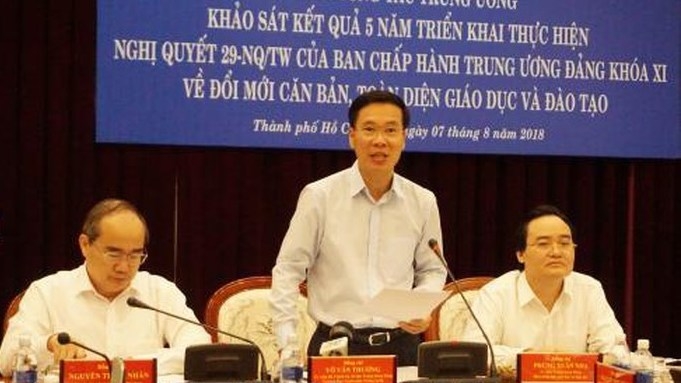
Politburo member Vo Van Thuong speaks at the session.
An inspection delegation of the Party Central Committee (PCC) held a working session with the Standing Board of the Ho Chi Minh City Party Committee last week, on the implementation of Resolution No.29-NQ/TW of the 11th Party Central Committee on fundamental and comprehensive education and training renovation.
The delegation was led by Politburo member, Secretary of the PCC and head of the PCC’s Communication and Education Commission, Vo Van Thuong.
According to a report presented by the Ho Chi Minh City Party Committee, over the past five years of implementation, the city’s education and training sector has made breakthroughs and continued to develop and maintain itself as a leading flag of the country. However, the city is also facing a lot of challenges including an increasing number of immigrants, which has led to pressure on school facilities and a high number of students per class.
Speaking at the session, Politburo member Thuong spoke highly of the positives results obtained by Ho Chi Minh City over recent years.
The city has made great efforts to implement and concretise the document into specific programmes and actions to create positive developments, especially in innovation in testing towards students capacity development; innovation in education and training management; building the capacity of teachers and educational instructors; and innovation in educational financial mechanisms and facilities, he noted.
He emphasised that Resolution No. 29 has defined the overall goal of creating a fundamental change in the quality and efficiency of education and training to better meet the construction process, national defence and the learning needs of the people.
President asks new ambassadors to promote economic diplomacy
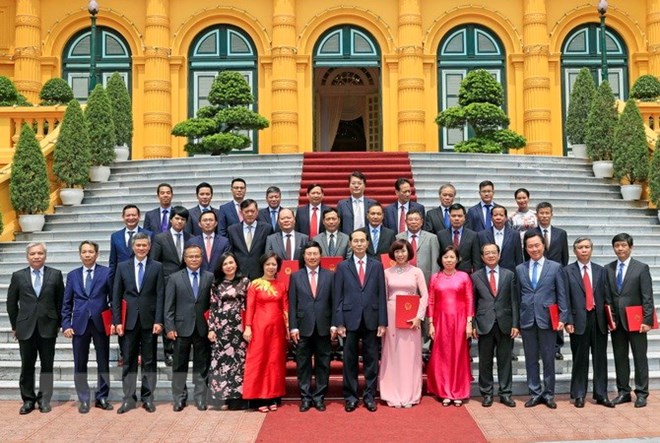
President Tran Dai Quang (7th from right, front row) takes a photo with newly-accredited ambassadors and heads of Vietnamese representative offices overseas
President Tran Dai Quang has asked newly-accredited ambassadors and heads of Vietnamese representative offices overseas to promote economic diplomacy to serve the country’s sustainable development.
Talking to 16 new ambassadors and 8 heads of Vietnamese representative offices overseas after presenting appointment decisions to them on August 9, the President told the diplomats that the country is at a critical stage in the process of international integration and implementing the socio-economic development strategy in 2011-2020.
At the same time, the regional and international situations are experiencing rapid and complex developments.
The global economy is entering a new period with opportunities and challenges. Added to this is the unstable and unpredictable political and security situation in the region and beyond, particularly the fiercer competition among power countries and the emergence of trade war, he said.
The State leader required the diplomats to keep close track of regional and global developments in order to make in-depth analysis and accurate forecasts along with proposing effective solutions to deepen Vietnam’s external relations with foreign countries, especially with neighbouring ones, power nations, and important partners.
The diplomats should proactively coordinate with relevant ministries and departments in preventing and warning against conflicts and pursuing peaceful settlement of disputes based on international law and regional principles of conduct.
At the same time, the diplomats must always be prepared with plans to firmly defend the national sovereignty, territorial integrity and interests while actively canvassing support from international friends, President Quang said.
He urged the diplomats to assist efforts to diversify and expand export markets for Vietnamese products and attract high-quality foreign investment.
Another task for the ambassadors and heads of representative offices overseas is to implement the Party and State’s consistent policy of actively involving in multilateral forums and organisations, especially in the Association of Southeast Asian Nations (ASEAN) along with regional forums and mechanisms, and the United Nations (UN).
The President also stressed the importance of the protection of Vietnamese nationals overseas, as close to 4.5 million Vietnamese are living abroad and millions of others are studying, working, travelling and doing business in foreign countries.
On behalf of the newly-accredited ambassadors and heads of representative offices, Deputy Foreign Minister Vu Hong Nam – who was appointed as Ambassador to Japan – pledged to work to build and maintain a peaceful environment and gather resources for the country’s sustainable development, and to enhance Vietnam’s position in the international arena.
Along with the overseas Vietnamese, the diplomats will serve as a bridge to connect and promote the friendship between Vietnam and other countries, he added.